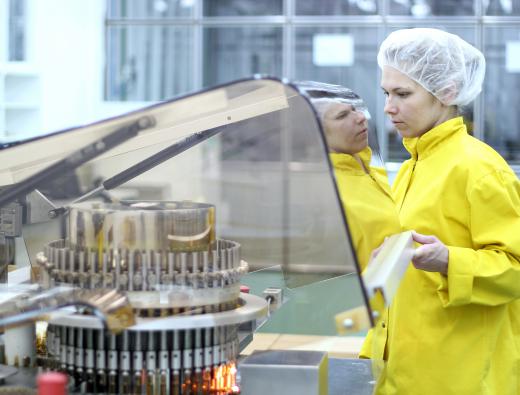A quality control (QC) technician is a person who makes sure that a product and its manufacturing process meet a company's quality and safety standards. These technicians are usually charged with making sure that the manufacturing process operates effectively and safely. They ensure that materials and manufacturing machinery are in proper order and help train production personnel to follow quality and safety practices. A quality control technician is also responsible for making sure that the workers follow the guidelines they are taught. When a failure does occur, a quality control technician is typically expected to make sure that an unsafe product does not reach consumers by correcting the error or keeping the product off the market.
Quality control can involve multiple tests during manufacturing to make sure no mistakes occur. This type of technician generally tests manufacturing materials and equipment before the manufacturing process, and conducts tests during manufacturing to make sure everything is running smoothly. Catching a mistake during the manufacturing process gives workers time to correct the problem, and avoids wasted time and raw materials. Quality control workers are also expected to observe production personnel to make sure they are doing things correctly. After manufacturing has completed, the QC technician usually inspects the final product to make sure that it meets quality standards.

On a large production line, a company will often have multiple quality control inspectors that supervise specific segments of the production process. A safety technician is a quality control technician whose job focuses mainly on keeping the production process and final product safe. In contrast, a quality control engineer is the worker who makes sure that the process and its mechanical parts are efficiently designed, maintained, and repaired in order to ensure safe operation and a quality product. A product inspector looks at the final product on the production line and makes sure that it meets quality and safety standards set by the company and government.

Performing the duties of a quality control technician often requires a skilled hand at recording data. Quality control personnel use data spreadsheets to understand how to best tweak the system for the highest level of quality and efficiency. These technicians often have a degree in math and are skilled at inputting data into computer spreadsheet programs.

Quality control is important in manufacturing because it makes sure that products are safe and that no one is hurt in the process of making them. Many governmental authorities have established quality standards for certain industries — especially food and children's toys. Quality control workers are a company's barrier against unleashing a dangerously defective product or carrying out an inferior manufacturing process. A failure in the quality control process can mean injured customers or workers, contaminated products, or faulty product construction.
